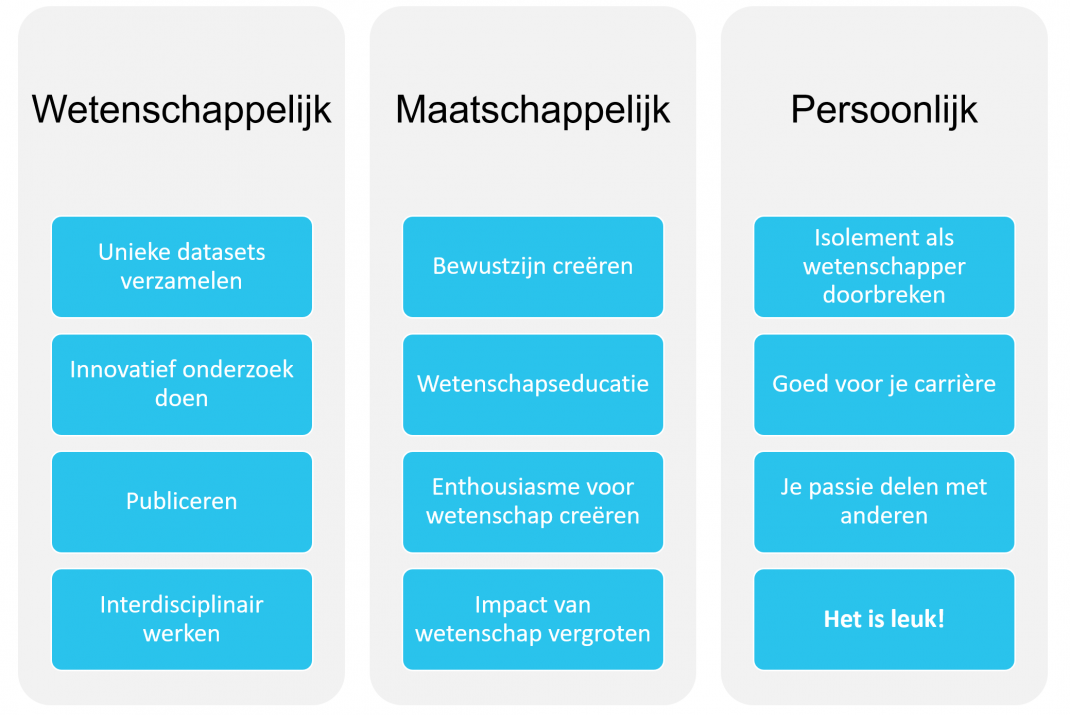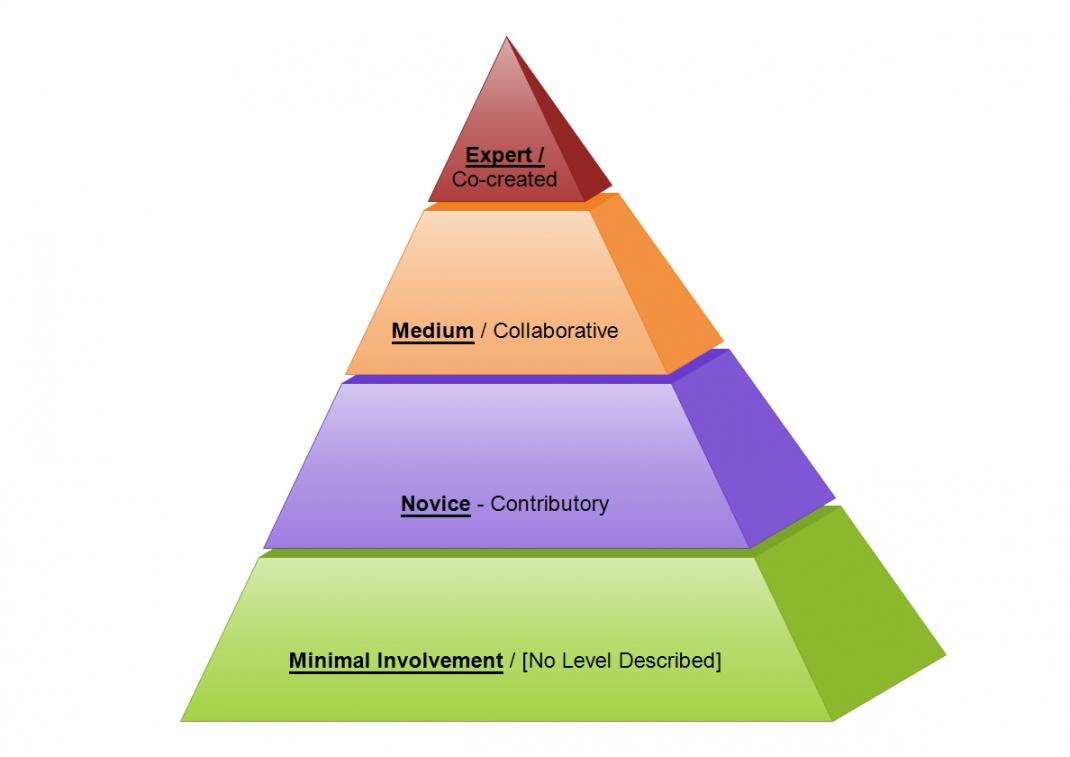Is citizen science for me?
Before getting started with citizen science, you have to know what it can and cannot mean to you. The phenomenon 'citizen science' is increasingly popular in Flanders and the world, but is citizen science suited for your project and research question?
What is citizen science?
Citizen science is scientific research that is entirely or partially conducted by non-scientists (citizens), often in collaboration with or supervised by professional scientists. The participating citizens in citizen science are called 'citizen scientists'.
Citizen science is a broad term. Citizen scientists can, depending on the project they are participating in, perform a broad spectrum of tasks; they can perform counts and observations, build and install sensors, annotate or transcribe text and images, analyze data, design research questions and research methods and report or disseminate research results.
For a broad definition we refer to the 10 principles of citizen science that the European Citizen Science Association formulated.

Reasons for choosing citizen science (Dutch). In 2019, Scivil asked initiators of citizen science projects what prompted them to include citizen science in their projects.
Does citizen science suit your research?
Citizen science projects that have a connection to the everyday environment of citizens or a societal concern (e.g. mobility, air quality, health...) are by nature more likely to attract and recruit participants. However, there are also large communities of passionate citizen scientists involved in biomonitoring projects such as Waarnemingen.be (Dutch) or online annotation platforms such as Zooniverse.org. Even projects that are a bit further from the citizens' everyday environment, such as counting seashells, transcribing historical sources or analyzing spectograms, are able to attract and engage large numbers of volunteers.
To conclude if citizen science suits your research, we advice to look at the decision tree in the guide 'Choosing and using Citizen Science' by the UK Centre for Ecology & Hydrology.
In some citizen science projects, a large number of volunteers performs a relatively simple task. In other projects, there is intense collaboration with a much smaller group of highly motivated citizen scientists. This consideration to collaborate with a small or large group of volunteers is depicted in the citizen science pyramid (OpenScientist.org). The basis is crowdsourcing and contributive projects, that attract a lot of citizen scientists to perform simpler tasks, thus gathering a lot of data.

4 levels of citizen science, as shown at OpenScientist.org.
Higher steps of the pyramid show more intense forms of collaborations; here, citizen scientists are not only involved in data gathering and analyzing, but also in drafting research questions, designing or choosing research methods and/or reporting on results. Because the interaction between the citizen scientist and the project leader is more intense on top of the pyramid and thus, requires more time, these projects generally rely on less citizen scientists than the lower levels of the pyramid.
Citizen science is more than just 'helping hands' for your research project. Compelling citizen scientists to stay involved in your projects takes time and a well-thought-out communication strategy. Read all about an effective strategy in our communication guide.
Reading tips
Ten principles of citizen science. (European Citizen Science Association, 2015)
Susanne Hecker, Muki Haklay, Anne Bowser, Zen Makuch, Johannes Vogel & Aletta Bonn, Citizen Science. Innovation in Open Science, Society and Policy. (UCL Press, 2018)
Darlene Cavalier & Eric B. Kennedy, The Rightful Place of Science: Citizen Science. (Consortium for Science, Policy, & Outcomes, 2016)
Darlene Cavalier, Catherine Hoffman & Caren Cooper, The Field Guide to Citizen Science: How You Can Contribute to Scientific Research and Make a Difference. (Timber Press, 2020)
Caren Cooper, Citizen Science. How Ordinary People are Changing the Face of Discovery. (Harry N. Abrams; 2016)
Alan Irwin, Citizen Science: A Study of People, Expertise and Sustainable Development. (Routledge, 1995)
Annie Bax and Tine De Moor, Do's en don'ts van citizen science. (Utrecht University, 2020) (Dutch)
Liesbeth Gijsel, Tine Huyse & Ine Van Hoyweghen, Citizen science - hoe burgers de wetenschap uitdagen. (Pelckmans, 2019) (Dutch)
Violet Soen & Tine Huyse Citizen Science in Vlaanderen: U telt mee?!, Views by the Young Academy. (Jonge Academie, 2016) (Dutch)
Guides
Dilek Fraisl, Gerid Hager ea., Citizen science in environmental and ecological sciences. (Nature Reviews, 2022)
Michael Pocock, Daniel Chapman, Lucy Sheppard & Helen Roy, Choosing and Using Citizen Science. (Centre for Ecology & Hydrology, 2014)
Lisa Pettibone, Katrin Vohland ea., Citizen science for all. A guide for citizen science practicioners. (Buerger schaffen Wissen, 2016)
John Tweddle, Lucy Robinson, Michael Pocock & Helen Roy, Guide to Citizen Science. Developing, implementing and evaluating citizen science to study biodiversity and the environment in the UK. (UK-EOF, 2012)
Online courses
University College London & Doing it together science, Introduction to Citizen Science & Scientific Crowdsourcing.
University of Reading, Citizen Science, an introduction.
University of Dundee & WeObserve, Citizen Science Projects: How to Make a Difference.
COST Action Workshop presentations, Citizen Science and Education.
GROW Citizen's Observatory & University of Dundee, Citizen Science: Sensing the World.